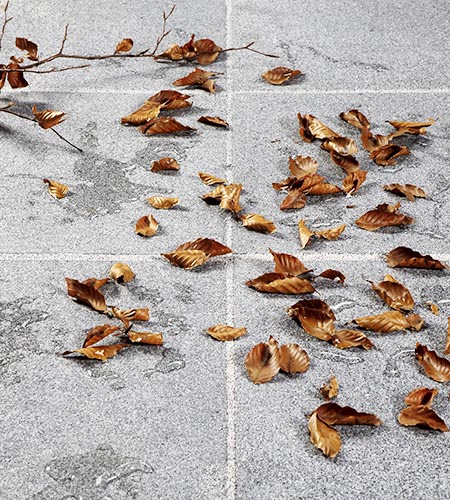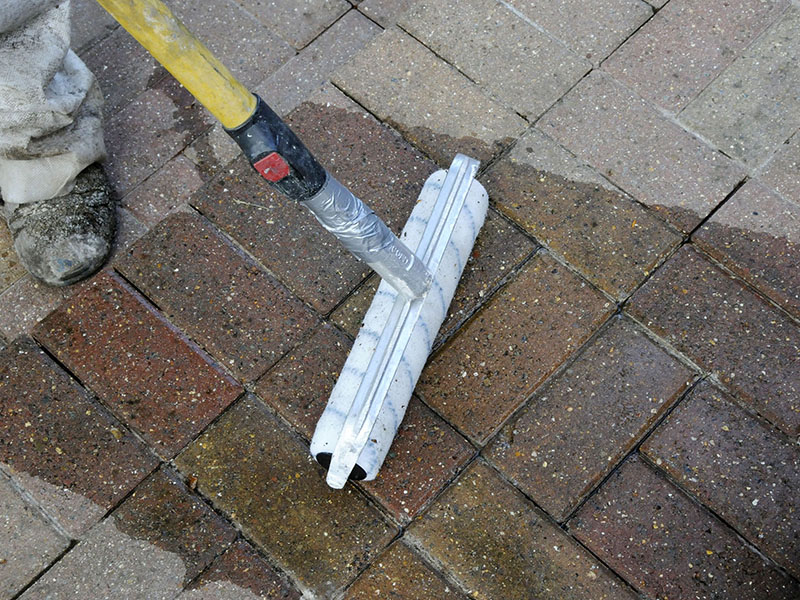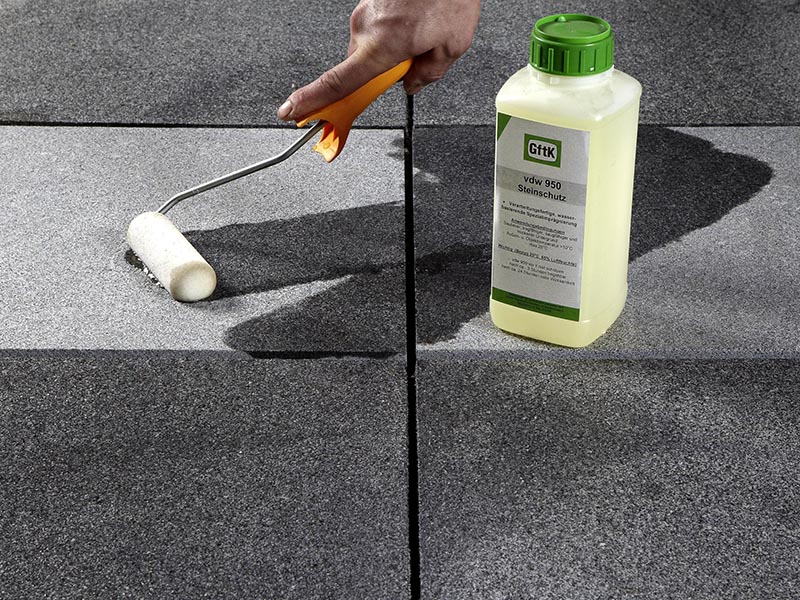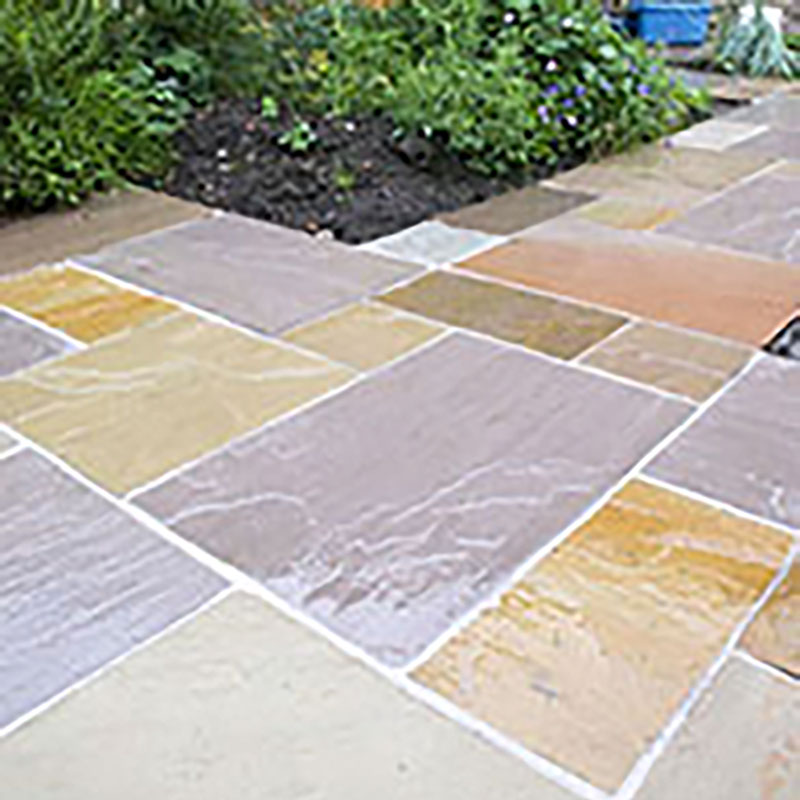Paving Sealing Technology FAQS
Paving Sealers – Technology & Selection - Guidelines
To provide more information on each of the alternative ‘Categories of Paving Sealer’ and the different ‘Types of Paving Sealer Materials’, we have summarized the main characteristics of the different Types and Categories of Paving Sealers for concrete block natural stone, and external porcelain tile paving below:
- Impregnating Paving Sealers – impregnating paving sealers are designed to penetrate completely and not to leave any significant film on the paved surface. Today these are usually based on silanes, siloxanes, fluorosilicates, or a blend of these materials dispersed in solvents or water, which is designed to penetrate and impregnate the pores and capillaries of the paved surfaces, forming a hydrophobic (water repellent) and oleophobic (oil repellent) finish.

- Surface Coating Paving Sealers – surface coating sealers for paved surfaces are designed to penetrate somewhat and / or to bond (e.g. on dense basalt or porcelain surfaces) to the open texture of the mineral substrate that makes up the paving element. There is always some dry film thickness of the material that remains visible on the surface, and it is this that can give a matt or gloss (wet look) finish to the surface. This film can also be tinted for products designed to ‘enhance’ the appearance. This type of paving surface sealers are usually based on Acrylic or Polyurethane resin materials, which again can be dispersed in suitable solvents, or increasingly with water due to the increasing H&S restrictions on solvent use.
These different categories of Impregnationg Paving Sealers and the film-forming Surface Coating Paving Sealers, each then also include a range of different types of materials technologies as indicated below. The different characteristics and properties of these different types of paving sealers and materials technologies, together with their respective advantages and potential disadvantages for your paving sealing project can be further summarised as outlined below:
Paving Sealing Technologies
‘Impregnation’ Type Paving Sealers
Paving Impregnations for use as sealers are usually designed around hydrophobic and oleophobic materials, and a based on Silanes, Siloxanes, Fluorosilicates or a combination of these materials. The range and cost-performance of the products on the market varies widely, as these include the much advertised and so-called 'Water Repellent Silicone Sealers', which NCC Streetscape would never recommend and will not supply. They can impregnate only for a short depth and do not react and bond so will last only a very short time, not even the summer in many cases, as they are quickly broken down in sunlight and can be flushed out by water jetting e.g. product like Thompsons Waterseal, or similar such equivalent private labelled Builders Merchants rubbish that can be demonstrated to work the day after they have been applied – try it 3 months later! - Please Do Not Use these inferior products unless you want a tatty looking job, are moving to a new house, or if you enjoy complaints and redoing the work!
Recommended impregnation materials for invisible paving sealing include water-borne Fluorosilicate ‘Pore Strengtheners’ that also bond into the structure and increase the paved surface resistance to wear, in addition to reducing the permeability. Alternatively, there are the water and/or solvent dispersed Silane and Siloxane based Paving Sealers, which will give good long-term water repellence and therefore also provide good long-term resistance to water-borne staining, as well as against frost or freeze-thaw, including de-icing salt resistance. The solvent based products are always going to be more efficient in colder weather and higher humidities and will generally have higher penetration properties – But solvents are increasingly restricted and expensive because they are not so environmentally friendly, so a great deal of investment and development has gone into producing the latest water-borne equivalents that NCC supply.
The main advantage of the impregnation products is that they penetrate fully into the paved surface and then work by bonding with and lining the pores of the concrete or stone paving, then due to their hydrophobic nature they are very effective at repelling liquid water; but without changing the surface appearance, or preventing water vapour transmission, plus many are also oleophobic, meaning that they also repel oil based staining. Efflorescence is also prevented or greatly reduced for concrete block paving, and the natural appearance is retained by natural stone surfaces, plus these impregnating products can be used safely on all types of porous and sensitive natural stone paving. The impregnating paving sealer type products from NCC Streetscape will last for many years and then they can also easily be refreshed, by simple re-application at any time in the future, whenever this eventually becomes necessary, which will be in several years in most situations.
In our experience and depending on the exposure, type of traffic and cleaning regimes this is only likely to be required after many years as the performance in service is excellent. For your additional information and comfort, this type of materials technology is also used throughout Europe, the USA and elsewhere in the developed world for the protection of reinforced concrete bridge structures against water ingress and damage due to de-icing salts and frost damage. Several of these materials are therefore now approved for this purpose by different National Highways Agencies, and this includes Highways England and the Department of Transport in the UK.
The only disadvantages in terms of impregnating sealers for paving protection is probably that there is no additional ‘enhancement’ and certainly no ‘wet-look’ achieved other than during application, which is of course very often a key advantage. However as a clear penetrating impregnation, the protection is not always visible and easily monitored, other than by its performance every time it rains! – So this is a very durable paving protection solution based on a totally different concept to the normal ‘visible sealer’ approach, by providing ‘invisible sealing and protection’ – These products are therefore usually the best solution for those who do not really want to seal their natural stone or make a glossy (albeit somewhat temporary) concrete block driveway, but who definitely do want to reduce staining and prevent frost damage to their paving.
Even the aforementioned ‘natural stone enthusiasts’ can frequently understand and agree with this approach, and so these impregnation sealer type products are increasingly considered acceptable, much better and increasingly preferred for stone protection in the modern environment. They will provide a high level of protection, maintaining the natural stone appearance, through effectively sealing the paved surfaces internally. Whilst certainly not cheap, their cost should always be considered in relation to their ‘invisible’ protection, extended service life and the ease of eventual reapplication, but which is only required after many years, all of which seems reasonable to us.
‘Surface Coating’ Type Paving Sealers:
The two most prominent types of ‘surface coating’ paving sealers materials technologies are either Acrylic Resin, or Polyurethane Resin based, both of which are available as water dispersed and solvent dispersed products. In principle the solvent dispersed materials are a bit higher performance and used to give longer durability, but the newer technologies in NCC Streetscape’s Paving Sealers using water dispersed materials, are now more than equal in performance and much more environmentally friendly to apply and in use.


Acrylic Based Paving Sealers
These are relatively cheap products and easy to apply. A matt sheen or gloss ‘wet look’ (albeit temporary) for the surface is normally achieved with 2 or 3 coats (subject to the substrate porosity and profile that determine consumption). Acrylic resin-based sealers are available as both solvent and water-borne products that means the resin is distributed and carried into the concrete or stone substrate, and the solvent or water then evaporates to leave a thin, residual dry surface film sealing coat. This gradually reduces in thickness during service, primarily through wear (abrasion) and UV light degradation from the surface during normal exposure and weathering, usually over a period of around 2-5 years, according to the paved areas type and level of traffic use and environmental exposure.
Acrylic Paving Sealers all have the disadvantage that the surface coating film is not particularly tough to resist traffic abrasion, and so any frequently / heavily used areas can soon wear and this worn trafficked area can become visibly ‘different’. This is especially the case with gloss finish ‘wet-look’ sealers.
A very wise old paving man once said: “If you like your paving with a wet-look, then why not just wet-it ...!” Conversely, when the gloss surface appearance is dulled by foot or vehicle traffic wera, it can easily be refreshed by cleaning the surface and simply over-coating with a refresher coat. However, this visible wear is very much less apparent when a matt or satin finish sealer is used so these types of acrylic paving sealer are the standard types that we recommend. It should also be stated that although the appearance may have been affected in this way, the protective capability is largely retained, and any water penetration or staining will continue to be greatly reduced. Additionally, even though these acrylic sealers will all require eventual re-application in 2 to 5 years depending on the traffic and exposure, this is also easy and relatively cheap to do with all of the acrylic resin based paving sealers. In fact this is sometimes claimed as an advantage for acrylic sealers over poyurethan resin ones for example, as their surfaces continue to cross-link after application, which makes them harder for sure, but they also require expensive blast cleaning or dangerous solvent reactivation for any overcoating too! Our selected acrylic resin based options are NCC Stone Sealer and the NCC Streetscape Stone Sealer (solvent dispersed) and NCC Stone Sealer and Enhancer (water dispersed), which are both available in our Online shop.


Black Limestone Paving Sealing and Restoration - In recent years there has been a bit of an explosion across the UK in the use of 'natural' Black Limestone paving that is very attractive and works well with many garden designs and like all limestone surfaces is generally reliable and hard wearing. The only issue in fact is that the beautiful black (well very dark grey) paving, only stays black in the ground as the bedrock, that is naturally never exposed to UV light and weathering, and this dark grey, black when wet, very attractive colour only lasts a little longer than the paving installation and grouting period......! Lots of contractors and stone dealers have had a lot of complaints, but this is not really or necessarily their fault, as even limited research will tell you this is the situation. Technically this is as a result of both atmospheric oxidation of black carbon-based pigments in the rock, with simultaneous UV light in the sunlight simuktaneously bleaching the surfaces and so it goes grey. When wetted again by rain or hose, than the underlying black pigment colour in the stone is refracted through the water on and in the surface pores, and so the paving appears to be black again – Magic!
As we all know: 'The customer is always right', and interestingly the stone is often strangely cheap (now guess why...?), and yes this phenomenon is well known, but only to those of us who regularly handle and work with this stone paving, which is mostly imported from India and China. So if we were now going to give it the right descriptive stone paving name, this should probably now be called: ‘Black for a few weeks after laying flat on the ground if you are lucky, or when it is completely wet Limestone Paving, otherwise and when dry this is really Light Grey Limestone Paving’. It is fine durable paving – BUT IS NOT ALWAYS BLACK.
As a result of this apparent deception and dodgy dealing being inferred, there are many people around the country that are somewhat disappointed with their black limestone patio, well in terms of its light grey colour anyways. - Otherwise it is usually fine light grey paving, black when wet though, so at least a fair percentage of the time here in the UK! In recent years there have been numerous products from paints to stains that have been produced to make the light grey limestone go ‘Back to Black’, usually based on black pigments in an acrylic resin dispersion (same basis as gloos black sealers). The clue to one of those sold widely is in the name! However this product and other versions of this, all tend to give a glossy finish after using them to bring the black colour back on the exposed surfaces – Once more and in the same way as other glossy acrylic paving sealers, this looks and is great, until you walk over it a bit and the trafficked area becomes clearly visibly and soon you have a different sort of unsightly result! – We think it looks worse than the light grey that is at least black every time it rains, just not when you are using your patio in the sunshine!
However, we have worked with some clever resin specialists and a couple of years ago they came up with a much better water dispersed, acrylic resin based product that gives a deep and dark, but matt finish, which is also very resistant to foot traffic across it. Indeed, we did a field trial on a popular Devon Pub’s Beer Garden Terraces a few weeks before their annual Music Festival in May 2018 - and as you can see in the pictures, it has stood up to this and other pub garden type traffic, with multiple spillages and general paving surface 'abuse' very well. This is now called NCC ‘Return to Black’ Stone Sealer, and is available in our Online shop.
Polyurethane Based (PU) Paving Sealers
Also called PU Sealers, these were traditionally the higher performance, solvented paving sealing products, which were originally designed for professional application and use in strictly dry and controlled conditions only due to some necessary levels of isocyanate content, plus they came with a seriously higher price – Well somethings don’t change! – So if you are ever offered a ‘cheap’ Polyurethane (PU) Resin Paving Sealer – Forget it!
 However, this original PU technology did and does provide a surface seal with long term durability, plus it can also provide substantial sand stabilisation on ‘flexibly’ laid concrete block paving. These are undoubtedly the best visible gloss or satin finish paving sealers for many commercial applications, but unfortunately these good quality polyurethane resin based paving sealers are also correspondingly very much more expensive. However, this should be considered together with their increased performance properties – so when viable on commercial applications the best performing polyurethane (PU) resin, product is generally agreed to be Resiblock 22, which is also still solvent dispersed to ensure the PU resin's penetration into the concrete surfaces and to mitigate against the adverse effects of any residual moisture, which is a potential issue because polyurethane resins are extremely moisture sensitive and so their limitations and controls during application and curing are critical. Not at all recommended for DIY applications, for all of the above reasons, but we can happily discuss the requirements and possibilities of arranging the professional application of these materials with you when appropriate. If this is of assistance, please call 01257 266696 or email technical@nccstreetscape.co.uk
However, this original PU technology did and does provide a surface seal with long term durability, plus it can also provide substantial sand stabilisation on ‘flexibly’ laid concrete block paving. These are undoubtedly the best visible gloss or satin finish paving sealers for many commercial applications, but unfortunately these good quality polyurethane resin based paving sealers are also correspondingly very much more expensive. However, this should be considered together with their increased performance properties – so when viable on commercial applications the best performing polyurethane (PU) resin, product is generally agreed to be Resiblock 22, which is also still solvent dispersed to ensure the PU resin's penetration into the concrete surfaces and to mitigate against the adverse effects of any residual moisture, which is a potential issue because polyurethane resins are extremely moisture sensitive and so their limitations and controls during application and curing are critical. Not at all recommended for DIY applications, for all of the above reasons, but we can happily discuss the requirements and possibilities of arranging the professional application of these materials with you when appropriate. If this is of assistance, please call 01257 266696 or email technical@nccstreetscape.co.uk
Important note: The costs of different types of paving sealing technologies and products can also appear to be hugely different. So, firstly always try to not only compare the cost per litre, but the cost per metre applied, including the costs of their different application requirements, and most importantly any costs from their limitations, e.g. polyurethane resin-based sealers can give good results in terms of durability and service life, BUT they require absolutely dry conditions for their application and curing – otherwise they can be a nightmare with delamination and white blooms forming under the coating etc. So, also consider what are the real additional costs of any possible weather delays, or expensive remedial works...?
The final consideration should always be the durability and service life required...?
– Are you happy to re-apply a sealer every year, or do you want a much longer service life? The calculated total costs can be far more comparable after all the relevant considerations for each project are considered. In our experience today, the best and most cost-effective options for natural stone sealers are usually either hydrophobic impregnating sealers or the matt finish types of acrylic surface sealers that can now also meet most exposure and performance requirements.
Additional note: At NCC Streetscape we do also have access to many more very specialised cleaning and sealing solutions and processes, but these are generally far more restricted by their cost and/or the necessary equipment required to use them. As a result these are only used by experienced, trained professionals, but if you think you need something more than the excellent products outlined on these pages, or you are uncertain of the best way to approach sealing your natural stone paving, then during normal office hours you call our paving team on 01257 266696 or email technical@nccstreetscape.co.uk with pictures if possible please, for FREE expert advice on the best and most cost- effective sealing options.
Alternatively - If you already know what type of Paving Sealer you need – Surface Impregnating Sealers type, or the Surface Coating Sealers type, you can Buy these now in our Online Shop.




